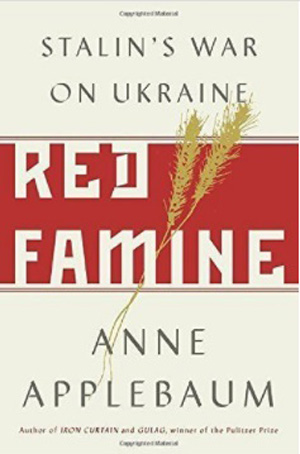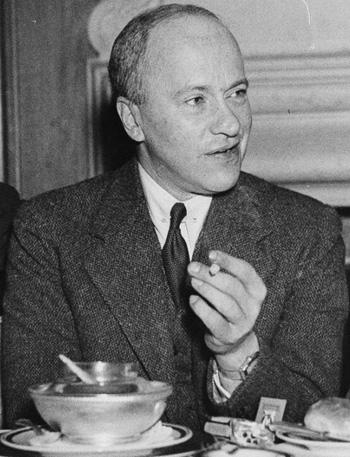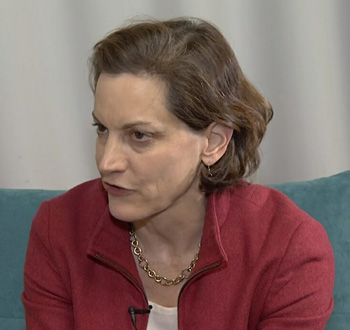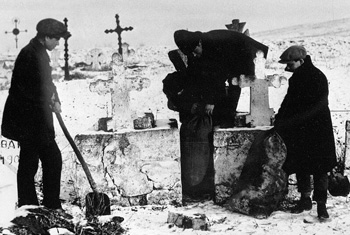Book reviews
 |
 |
 |
 |
 |
 |
 |
‘Noble Purpose,’ Terror Famine
& the ‘Greatest Liar’
Book review of Red Famine, Stalin's War on Ukraine by Anne Applebaum
New York: Doubleday, 2017, 496pp.
New York: Doubleday, 2017, 496pp.

Stalin demanded secrecy for his calculated savagery in Ukraine and other areas of the Soviet Union. The Union of Soviet Socialist Republics needed the trade and technology benefits which would flow from recognition of the Communist State by the United States and, if the true magnitude of the terror famine became apparent, Stalin's regime would become an international pariah. There were already various Russian emigré groups working against Soviet interests and verified accounts of the starvation of millions in the USSR (especially in Ukraine) would make any political or economic relations with the U.S. impossible.
Enter Walter Duranty
Duranty, The New York Times correspondent from 1922 to 1936, is described by Applebaum as one who "had no ties to the ideological left, adopting rather the position of a hard-headed and skeptical 'realist' trying to listen to both sides of a story." She then cites a 1935 statement from Duranty comparing the vivisection of animals [done for medical reasons, one presumes] and the fate of the kulaks (successful Ukrainian property owners who were the particular target of Stalin and the terror famine). "It may be objected that the vivisection of living animals is a sad and dreadful thing, and it is true that the lot of kulaks and others who have opposed the Soviet experiment is not a happy one," but Duranty continued, "in both cases, the suffering inflicted is done with a noble purpose" [p.310].

The New York Times correspondent Walter Duranty was a communist agent loyal to Stalin
Taken across the whole of the USSR, the "noble purpose" was called Stalinism, the peculiar brand of Communism introduced by the Soviet dictator, who advanced both collectivized and industrialized in the Soviet Union through fear, intimidation, brutal imprisonment and murder. Stalin sought to build "Socialism in one country" as opposed to Lenin and Trotsky's call for world revolution. Stalin did, however, develop a vast network of spies and pro-Soviet cooperators throughout the world (including the U.S.) for the advancement of Stalin's brand of Communism.
Duranty, an essential part of this effort
Applebaum recognizes Duranty's bias toward the Soviets and his usefulness "to the regime, which went out of its way to ensure that he lived well in Moscow," but sees "the primary motivation for Duranty's flattering coverage of the USSR" as "the attention he won from his reporting." Applebaum then mentions the unparalleled influence he had in the U.S. with "the men who would become part of Franklin Roosevelt's 'Brains Trust'" who "were looking for new economic ideas and had a deep interest in the Soviet experiment..." Duranty, who had won the Pulitzer Prize for his reporting on the Soviet Union, traveled to New York in 1932 and met with then-New York governor and presidential candidate Franklin D. Roosevelt. Applebaum states that Roosevelt "peppered" Duranty with questions and the future U.S. President found the encounter with The New York Times foreign correspondent "fascinating."

Anne Applebaum
While large areas of Ukraine and other areas of the USSR were sealed off by Soviet authorities, millions starved from confiscation of all edible produce. Duranty not only discounted any news of the terror famine but also successfully blunted reaction to reports from the few correspondents who dared to report the truth about the terror famine. One of these, Malcolm Muggeridge, would later describe Duranty as the "greatest liar of any journalist I have ever met."
Another British journalist, Gareth Jones, issued a press-release concerning his journey through the devastated Soviet regions, drawing a sharp rebuke from Duranty and a counter-statement from Jones. After the publication of his reports, Jones was banned from the Soviet Union and was later killed while reporting on China. His death was officials described as at the hands of Chinese bandits, as Applebaum relates. There is, however, more to the death of the brave journalist. There is strong evidence that operatives from the Soviet NKVD (later known as the KGB) were angered at Jones' reports on the terror famine and were responsible for Jones' death. Jones had also learned of secret Soviet military assistance to Mao Zedong's communist rebels, and the Soviets may also have wanted to prevent Jones from reporting on overt Soviet intervention in China's civil war.
Duranty's loyalty to Stalin and Stalinism was so complete that some later believed that he was actually an agent for Soviet intelligence. American ex-communist Jay Lovestone seems to have held this opinion, as did veteran U.S. journalist Joseph Alsop. Whether in the direct pay of the Soviets or as simply a pro-Soviet lackey, Duranty was instrumental during his career in frustrating an accurate understanding of the Soviet Union and its intentions. His loyalty to Stalin was complete, even to the point of writing an obituary for the Soviet dictator in 1953.

Communists stealing grains hidden in a graveyard from Ukranian peasants
During his rule, Stalin's version of Communism was dominant in the world, from the rural collectives in the USSR to the literary set in New York and for many actors and writers in Hollywood. Duranty hid what he could of Stalin's horrors, and what he could not hide he lied about. Duranty made possible the existence of a credible pro-Communist/pro-Stalinist movement in the U.S. during the 1930s and 1940s, the effect of which remains strong in intellectual quarters today, and even in the general society. The term "anti-Communism" now rates on the same level as a Woody Allen punchline.
Duranty would be gratified.

Posted January 12, 2018
______________________
______________________
 Volume I |
 Volume II |
 Volume III |
 Volume IV |
 Volume V |
 Volume VI |
 Volume VII |
 Volume VIII |
 Volume IX |
 Volume X |
 Volume XI |
 Special Edition |


